Navigating Halloween with Sensory Sensitive Children
Boo! Did I scare you? No? Well, I bet I know what might be scaring you as a parent of a sensory-sensitive child: Halloween. As the jack-o’-lanterns start to grin and the leaves crunch under your feet, many of us are filled with a mix of excitement and trepidation. Will this be the year we finally nail the perfect Halloween experience, or are we in for another night of sensory overload and tears?
I remember my first Halloween with my son, Sam. We had the cutest lion costume picked out, complete with a furry mane and a tail. But as soon as we slipped that mane over his head, the meltdown began. The scratchy fabric, the unusual sensation on his face – it was all too much. That night ended with a quick dash around the block in regular clothes and a lion mask held tentatively in hand.
If you’re nodding along, thinking of your own Halloween tribulations, you’re in the right place. In this article, we’ll explore the unique challenges of Halloween for sensory sensitive children and discuss strategies to make the spooky season more treat than trick. We’ll cover understanding common disappointments, coping strategies for parents, encouraging emotional expression, and creating positive Halloween experiences.
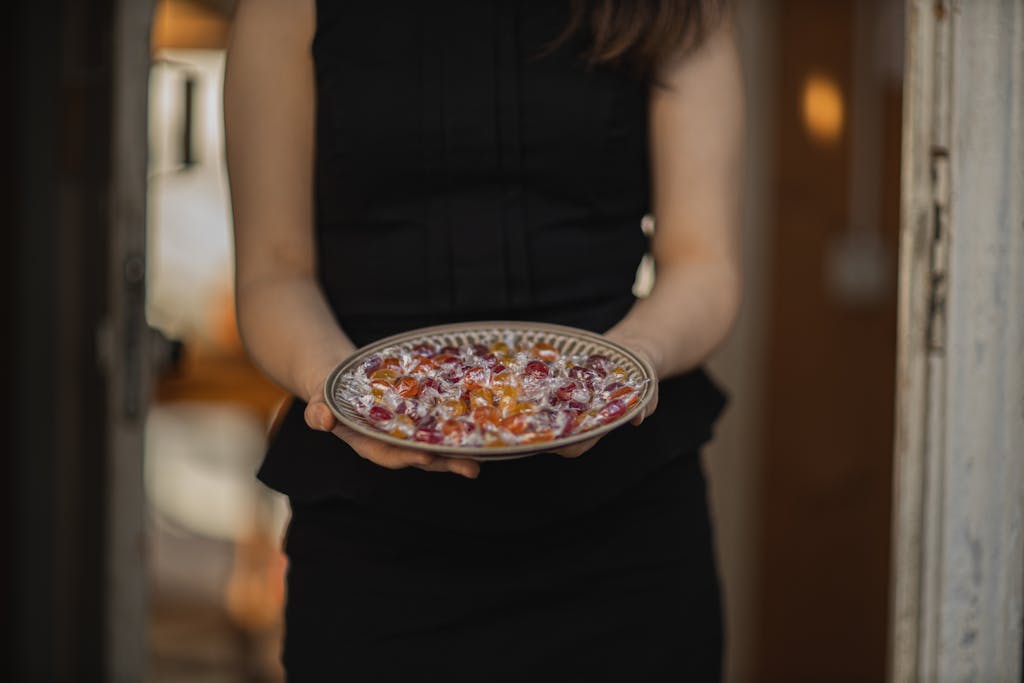
Halloween: More Than Just Candy and Costumes
Halloween, with its roots in ancient Celtic traditions, has evolved into a beloved family holiday. For many children, it’s a night of magic, imagination, and yes, sugar rushes. But for our sensory-sensitive little ones, Halloween can be a minefield of overwhelming experiences.
The rustling costumes, the unpredictable sounds of doorbells and “Boo!”s, the unfamiliar textures of face paint and masks – all of these can trigger sensory overload. Add in the social pressures of trick-or-treating and the disruption to routine, and you’ve got a recipe for potential meltdowns.
Recent research suggests that children with sensory processing difficulties often experience higher levels of anxiety during holidays like Halloween. For these children, the excitement of Halloween can quickly turn to fear or discomfort. It’s crucial for parents to understand and anticipate their child’s specific triggers.

Understanding Common Disappointments
One of the biggest challenges of Halloween for sensory-sensitive children (and their parents) is managing expectations. The gap between the idealized Halloween experience and reality can lead to significant disappointment and frustration.
Costume Conundrums
Halloween Costumes are often the first hurdle. The scratchy fabric of a superhero outfit, the weight of a princess gown, or the constriction of a mask can all trigger sensory discomfort. I’ll never forget the year Sam was desperate to be a firefighter, only to discover he couldn’t tolerate the feel of the plastic hat on his head.
Weather Woes
Unpredictable weather can throw a wrench in even the best-laid Halloween plans. A sudden cold snap might necessitate bundling up under a carefully chosen costume, changing its look and feel. Rain can make masks uncomfortable and slippery, not to mention the sensory challenge of wet clothes.
Trick-or-Treat Troubles
The actual process of trick-or-treating can be overwhelming. Crowds of excited children, unfamiliar houses, and the social pressure of saying “trick or treat” can all contribute to anxiety and sensory overload.
Understanding these potential pitfalls is the first step in navigating them. It’s okay to admit that Halloween might not always live up to the picture-perfect images we see on social media. The key is to adjust our expectations and focus on creating a positive experience that works for our unique children.
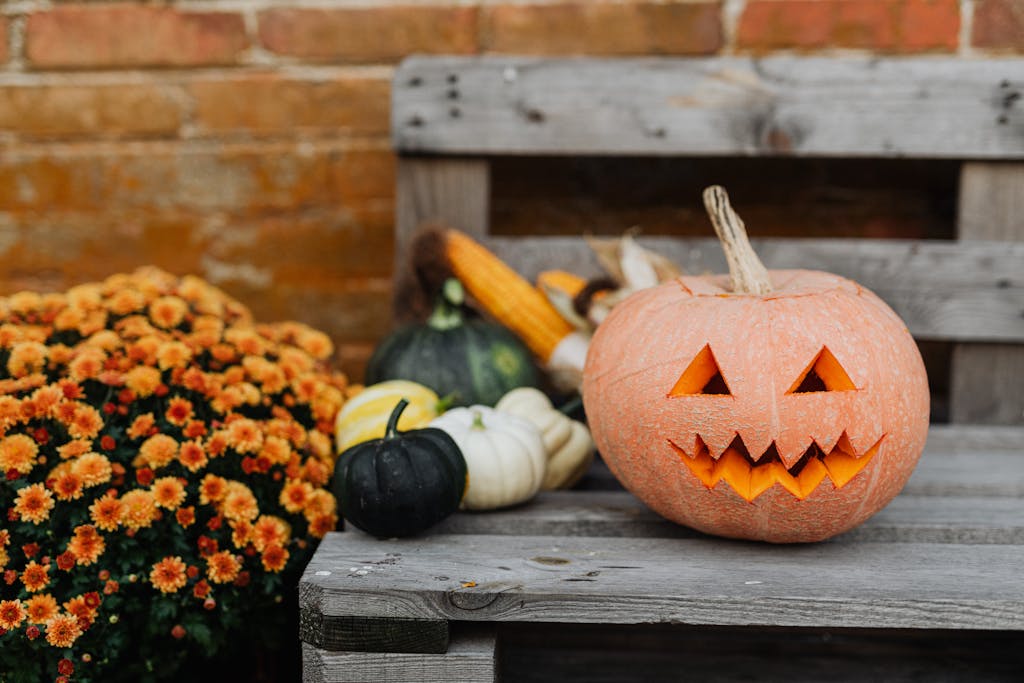
Coping Strategies for Parents
As parents, our own stress and anxiety can often amplify our children’s reactions. Here are some strategies to help you stay calm and supportive throughout the Halloween season:
1. Prepare and Plan: Start talking about Halloween well in advance. Use social stories or Halloween picture books to familiarize your child with what to expect. Practice wearing costumes or parts of costumes for short periods to build tolerance.
2. Create a Safety Plan: Decide on a signal your child can use if they’re feeling overwhelmed and need a break. This could be a special word, a hand gesture, or even a small card they can show you.
3. Be Flexible: Remember, there’s no one “right” way to do Halloween. If trick-or-treating is too much, consider alternatives like a small party at home or a trunk-or-treat event at a familiar location.
4. Take Care of Yourself: Don’t forget your own needs in the midst of Halloween preparations. Take time to recharge and manage your own stress levels. A calm parent is better equipped to handle unexpected challenges.
5. Find Your Support Network: Connect with other parents of sensory-sensitive children. Sharing experiences and tips can be incredibly reassuring and helpful.
One year, feeling overwhelmed by the prospect of another difficult Halloween, I reached out to a local support group for parents of children with sensory issues. We ended up organizing a small, sensory-friendly Halloween party. Seeing Sam confidently navigate this controlled environment, proudly showing off his costume (a soft, homemade robot outfit) to understanding peers, was a turning point for us both.
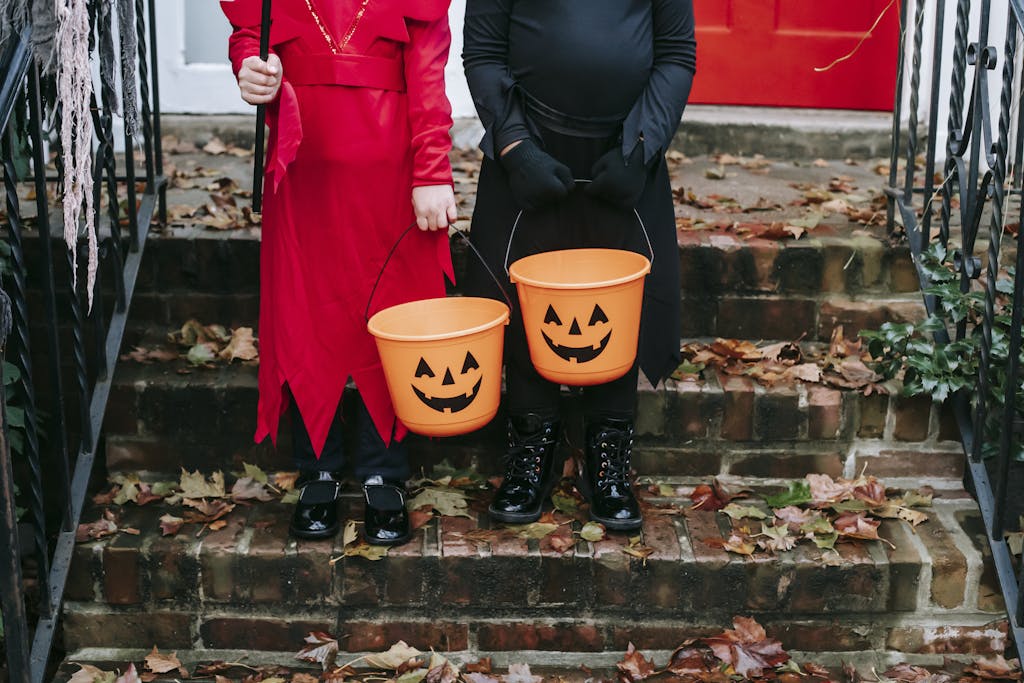
Encouraging Emotional Expression
One of the most important things we can do for our sensory-sensitive children is to help them understand and express their emotions. Halloween, with its mix of excitement and potential overwhelm, provides an excellent opportunity to practice these skills.
1. Create a Halloween Emotion Chart: Design a visual chart with different emotions related to Halloween activities. This could include excitement, fear, happiness, and overwhelm. Use this chart to help your child identify and communicate their feelings throughout the Halloween season.
2. Practice Calming Techniques: Teach and practice calming techniques that your child can use if they start to feel overwhelmed. This might include deep breathing exercises, counting to ten, or using a small fidget toy.
3. Validate Their Feelings: If your child expresses fear or discomfort about Halloween activities, resist the urge to dismiss their feelings. Instead, acknowledge them and offer support.
4. Celebrate Small Victories: Recognize and celebrate when your child successfully navigates a challenging Halloween situation. This positive reinforcement can build confidence for future experiences.
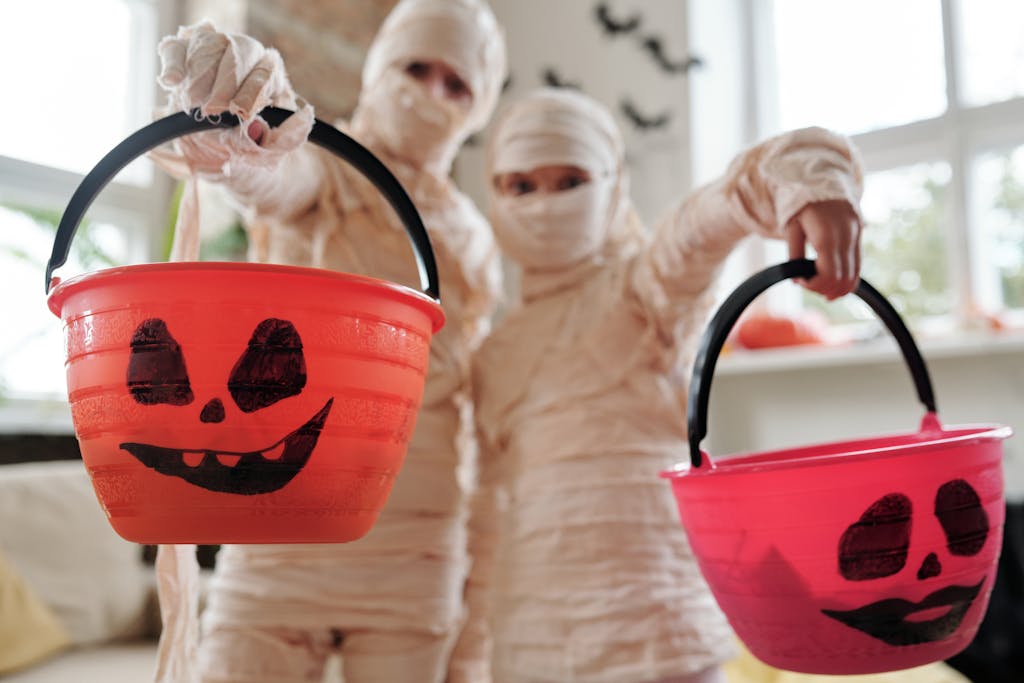
Creating Positive Halloween Experiences
With some creativity and planning, we can create Halloween experiences that are enjoyable for our sensory-sensitive children. Here are some ideas:
Sensory-Friendly Costume Ideas
Create a costume based on your child’s favorite soft clothing
Use face paint instead of masks if your child is comfortable with it
Consider costumes that don’t require headpieces or gloves if these are triggering
Alternative Celebrations
Host a small Halloween party with familiar friends in a controlled environment
Create a Halloween scavenger hunt in your home or backyard
Visit a pumpkin patch or apple orchard for fall fun without the intensity of trick-or-treating
Modify Trick-or-Treating
Start early when it’s less crowded and still light out
Visit only a few familiar houses
Arrange for family or close friends to be your trick-or-treating “stops”
Remember, the goal is to create positive associations with Halloween, not to force a particular version of the holiday. Our family’s Halloween tradition now includes a mix of at-home activities and a short neighborhood walk to admire decorations. Sam helps choose which houses look “friendly” for trick-or-treating, and we usually end up at about five doors. It’s not the Halloween I initially imagined, but seeing Sam’s excited grin as he carefully arranges his small candy haul makes it perfect in its own way.
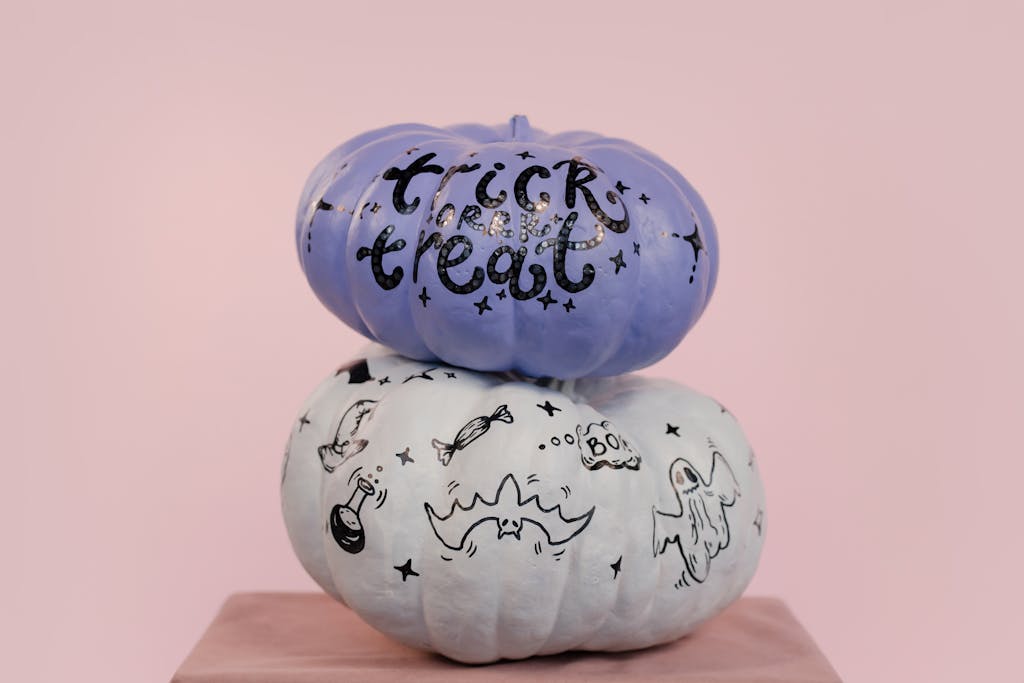
Frequently Asked Questions About Halloween for Sensory-Sensitive Kids
The key to a successful Halloween for sensory-sensitive children is preparation and flexibility. Start small, build gradually, and always follow your child’s lead.
Here are some frequently asked questions about Halloween and sensory sensitivity:
Q: How can I help my child choose a comfortable costume?
A: Involve your child in the costume selection process. Focus on soft, familiar fabrics and consider adapting regular clothes into a costume.
Q: What if my child doesn’t want to trick-or-treat at all?
A: That’s perfectly okay! There are many ways to celebrate Halloween at home, from pumpkin carving to Halloween-themed games.
Q: How can I explain to others why my child might not participate in typical Halloween activities?
A: Be honest and direct. Most people are understanding when you explain your child’s needs. You might say, “Sam enjoys Halloween in his own way, which might look a little different from what you’re used to.”
Wrapping Up: Ensuring a Fun and Comfortable Halloween for Sensory-Sensitive Kids
Navigating Halloween with a sensory-sensitive child can be challenging, but it’s also an opportunity for growth, creativity, and family bonding. By understanding our children’s needs, preparing thoughtfully, and remaining flexible, we can create Halloween experiences that are enjoyable for everyone.
Remember, there’s no one “right” way to do Halloween. What matters most is that your child feels safe, supported, and included in the celebration. Whether that means a full night of trick-or-treating, a quiet evening of Halloween crafts at home, or something in between, you’re creating precious memories and positive associations with the holiday.
As we approach another Halloween, I’m filled with excitement rather than dread. I know there may be challenges ahead, but I also know that Sam and I will face them together, creating our own special kind of Halloween magic along the way.
Happy Halloween, everyone! May your night be filled with more treats than tricks, and may the Great Pumpkin bring you all the joy and peace you deserve.
Bonus Content! Top 10 Must-Have Halloween Decorations to Transform Your Home
- [Realistic and Bright]: These flameless votive candles copy the appearance of real candles, with wavy edges, emits bright light. The soft flicker of candles simulates the most realistic traditional combustion effect, brings the most realistic experience to users
- 【Scary Halloween Decorations Outdoor Indoor】Our halloween caution tape and do not enter tape can create more creepy vibe, easily make your home become a real haunted house. the halloween caution tape is great halloween door decorations, indoor halloween decorations and outdoor halloween decoraions.
- Perfect Halloween Decoration: Ideal Halloween decorations, A frightening fabric ornament, often used as a spooky haunted house decoration.
- SUPER VALUE PACK. Our Neon Glow Stickers Party Supplies Set includes 144 pieces of glowing stickers to add more fun to your extra special party celebration!
- 1 Pack 16″ small skeleton with realistic bone details for creepy halloween decor.
- Perfect Halloween Party Decorations: Spider webs must be one of the simplest ways to add Halloween atmosphere to your haunted house or Halloween party. White spider web looks like real cobwebs, making your house looks like an abandoned cabin or your living room likes a creepy cellar.
- Complete Package: Includes 4 pieces for a comprehensive decoration setup, allowing you to easily craft a spooky ambiance that will delight both children and adults alike.
- Perfect Halloween Party Decorations: Spider webs must be one of the simplest ways to add Halloween atmosphere to your haunted house or Halloween party. White spider web looks like real cobwebs, making your house looks like an abandoned cabin or your living room likes a creepy cellar.
- Halloween Serving Set: 3 witches cauldron bowls on rack, perfect for Halloween party supplies or decorations
- Comprehensive Coverage for Engaging Displays: This 200 square feet Spider Web offers ample coverage for creating eye-catching and spooky displays, perfect for Halloween events, parties, or haunted houses. Transform any space with this extensive webbing for an unforgettable experience.
Disclaimer
If you shop our links we may receive a small commission which funds our Halloween candy addiction. Thanks for the support!














